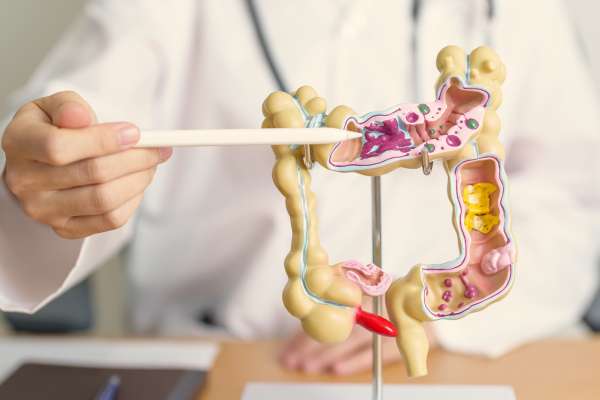Is mushroom coffee a good choice for managing IBS? With 25% of IBS sufferers experiencing issues with regular coffee, alternatives like mushroom coffee are gaining attention. This article will explore the pros and cons of mushroom coffee for those with IBS, aiming to help you make an informed decision. Keep reading to find out more!
Understanding IBS (irritable bowel syndrome)
Understanding IBS (irritable bowel syndrome) can be challenging. It is characterized by symptoms like abdominal pain, bloating, and changes in bowel habits but varies in its effects on daily life.

Causes and symptoms
Living with IBS (irritable bowel syndrome) means facing a unique set of challenges every day. This condition can impact one’s daily life, making understanding its causes and symptoms crucial.
Causes of IBS:
- Complex Interactions: IBS often results from the complex interplay between the brain and the gut. These two are supposed to work harmoniously, but sometimes, they need to communicate more effectively.
- Gut Motility Issues: The way your intestines move food can affect you. Some people’s intestines move too fast, while others might move too slowly.
- Sensitive Nerves in the Gut: Some individuals’ guts are more sensitive. This means they can react strongly to things that wouldn’t bother other people.
- Severe Infection: A severe bout of diarrhea caused by bacteria or viruses can trigger IBS. Sometimes, even after the infection has cleared, IBS symptoms remain.
- Changes in Microflora: The good bacteria in your gut play a significant role in health. If these are out of balance, it could lead to symptoms of IBS.
Symptoms of IBS:
- Abdominal Pain and Cramping: This is like feeling a constant stomachache that might get better after going to the bathroom.
- Diarrhea and Constipation – Sometimes Both: People with IBS may have days when they can’t stop going to the bathroom and other days when they wish they could go.
- Bloating and Gas: Eating might make you feel like you’re suddenly carrying around a balloon in your tummy because of how bloated you get.
- Food Intolerance: Certain foods no longer agree with your system, leading to discomfort when you eat them.
Understanding these factors gives insight into why managing IBS requires a careful approach tailored to each person’s unique situation. From diet adjustments such as following a low FODMAP diet to finding coffee alternatives like mushroom coffee that may be gentler on the stomach, individuals with IBS symptoms have various strategies at their disposal for navigating this condition.
Effects on daily life
IBS significantly disrupts daily activities, making routine tasks challenging for those affected. Symptoms like stomach pain, diarrhea, and constipation can strike any moment, leading to missed work or school days.
What is Mushroom Coffee?
Mushroom coffee is a blend of regular coffee and powdered mushrooms, such as lion’s mane or chaga. It differs from traditional coffee due to its unique benefits and potential stomach-friendly properties.
- Related read: Is Mushroom Coffee Low FODMAP? What’s the Truth?
Ingredients and how it differs from regular coffee
Mushroom coffee blends ground coffee beans with extracts from medicinal mushrooms like lion’s mane, chaga, and reishi. This unique mix offers a taste similar to your traditional cup of joe but less acidic.
Because of its lower acidity, many find mushroom coffee more stomach-friendly, especially those dealing with IBS.
Unlike regular brews with high caffeine content, coffee introduces a lower-caffeine option. This is good news for anyone needing to cut back on their caffeine intake without sacrificing the ritual of enjoying a warm beverage.
The specific ingredients vary by brand, so checking labels is critical to avoiding potential IBS triggers or other digestive issues.
Exploring the Benefits of Mushroom Coffee for IBS
Mushroom coffee may be more leisurely on the stomach and digestive system, potentially providing anti-inflammatory effects and improving mental clarity and focus for IBS sufferers. To learn more about how mushroom coffee could benefit individuals with IBS, continue reading.

Easier on the Stomach and Digestive System
With its prebiotics and lower acidity, mushroom coffee may be gentler on the stomach than regular coffee. This can be beneficial for individuals with IBS who often experience digestive discomfort.
Additionally, research suggests that mushroom coffee could offer relief for some individuals struggling with IBS symptoms by supporting gut health and reducing overall stomach upset.
Mushroom coffee holds promise in providing a more comfortable option for those dealing with stomach sensitivity related to IBS.
Potential anti-inflammatory effects
Mushroom coffee has special mushrooms like reishi, cordyceps, chaga, and lion’s mane that might help calm swelling in the body. These mushrooms have stuff in them that fights swelling, which can make people sick. Scientists have seen that these mushrooms help lower swelling inside us. The good things in mushrooms could help people feel better if they have problems like IBS. Mushroom coffee not only tastes different and gives people another choice besides regular coffee but also helps with swelling and makes people feel better.
How It Improves Mental Clarity and Focus
Mushroom coffee may boost mental clarity and enhance focus, potentially aiding in reducing stress and anxiety. The proposed benefits of mushroom coffee include improved concentration, which could benefit individuals with IBS-related challenges.
Interesting facts hint that mushroom coffee could have a good effect on your mind and mood, making it a choice to think about for those wanting to take care of their symptoms better.
Potential Drawbacks of Mushroom Coffee for IBS
Mushroom coffee may still trigger symptoms for some individuals with IBS. Some types of mushrooms used in mushroom coffee may have a high FODMAP content, which can exacerbate gastrointestinal issues.
May still trigger symptoms in some individuals
For specific individuals, mushroom coffee could still provoke symptoms related to their IBS. Notably, the caffeine content in mushroom coffee may cause discomfort for some people with IBS, leading to aggravated symptoms such as diarrhea or stomach pain.
Additionally, the polysaccharides found in mushrooms could contribute to bloating in individuals sensitive to this aspect of mushroom coffee.
Remember that while many individuals find relief in switching to mushroom coffee due to its potentially gentler effects on the digestive system, it’s crucial to recognize that it may not suit everyone with IBS.
Considerations for IBS Sufferers

Consult your doctor or a dietitian before you try mushroom coffee. Try different kinds to see what you like, and add things that are easy on the stomach. Your doctor or dietitian can help you choose what’s best for your health and make sure it’s safe with any conditions or medicines you have. This way, you can enjoy mushroom coffee and take care of your IBS symptoms too.
Experimenting with different types and blends
Experimenting with different types and blends of mushroom coffee is crucial for finding the right match for your body. When experimenting, consider each blend’s potential benefits and drawbacks. Here are some tips for trying out various types and blends:
- Start with a small serving size to gauge your body’s reaction.
- Look for blends containing adaptogenic mushrooms, which may help with stress and fatigue.
- Consider decaf options if you’re sensitive to caffeine.
- Check the FODMAP content to ensure it aligns with your dietary needs.
- Experiment with adding low-FODMAP additives like coconut milk or ghee for extra stomach-friendliness.
- Keep a journal to track how each type and blend affects your IBS symptoms.
Adding low-FODMAP additives
Adding low-FODMAP additives can help alleviate IBS symptoms; here are some options to consider:
- Incorporate sources of soluble fiber such as chia seeds, flaxseeds, and psyllium husk into your diet.
- Include fruits like bananas, berries, and oranges, which are low in FODMAPs and can provide essential nutrients.
- Use low-FODMAP sweeteners such as maple syrup or stevia for a touch of sweetness without aggravating symptoms.
- Incorporate spices like turmeric, ginger, and cumin for flavor and potential anti-inflammatory benefits without triggering IBS symptoms.
Conclusion
In summary, mushroom coffee could be a softer choice for those with IBS who find regular coffee’s acidity and caffeine hard to handle. However, before switching, it’s important to look at the types of mushrooms in the coffee and talk to a healthcare expert.
FAQs
- What is mushroom coffee, and can it help someone with IBS?
Mushroom coffee mixes traditional coffee with mushroom extracts, which may be stomach-friendly for some people. According to Monash University, it’s a blend worth exploring for those dealing with IBS, especially since certain mushrooms contain low polyols in FODMAPs.
- Is all coffee bad for IBS flare-ups?
Not necessarily! While regular black coffee might stir the pot for some folks with sensitive stomachs or acid reflux issues, decaf or low-caffeine options like mushroom coffee could be easier on the belly. It’s about finding what works best for you.
- Can drinking too much mushroom coffee cause problems?
Just like anything else, moderation is key. Mushroom coffees vary in caffeine content and fermentable compounds—so while a cup may soothe your system, overdoing it could backfire if you’re sensitive to these elements.
- How does one make mushroom coffee an alternative to regular brews?
Simple—mix ground mushrooms (from brands like Four Sigmatic) into your usual grounds, or look for ready-made blends online. If you’re cutting back on caffeine or managing constipation-predominant IBS, this switch might just hit the spot.
- Are there specific types of mushrooms used in these coffees?
Yes! Commonly used varieties include reishi and chaga—both heralded for their health benefits beyond being low-FODMAP friends. They’re believed to support overall wellness, but remember, everyone’s body reacts differently!
- Should I talk to my healthcare provider before trying mushroom coffee?
It’s always wise to talk with your healthcare provider before making any significant changes to your diet or introducing new remedies into your routine, especially if you have conditions like SIBO (Small Intestinal Bacterial Overgrowth) alongside IBS.




